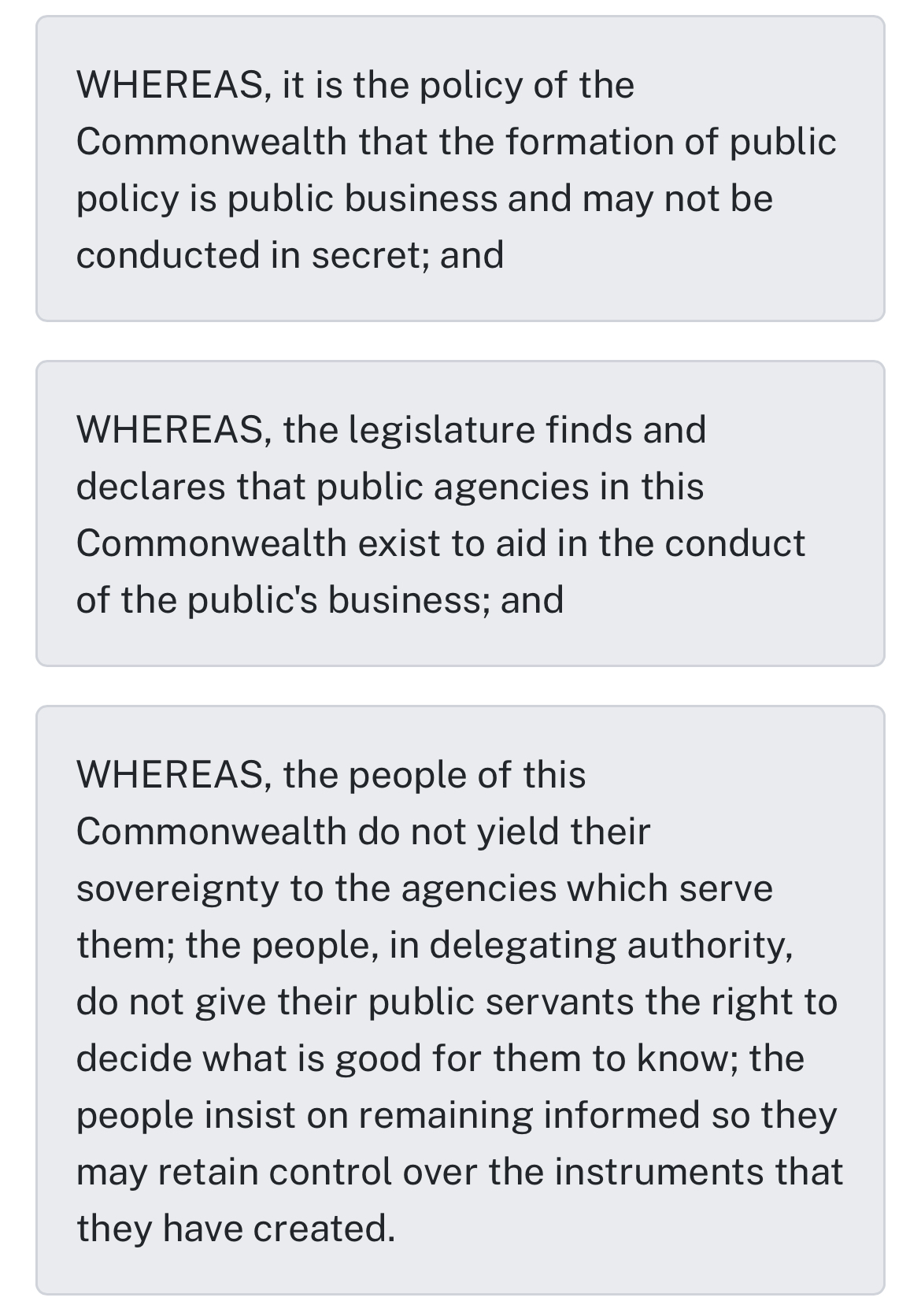
For those who may have questioned the Kentucky Open Government Coalition tweet about a story -- concerning a Fayette County Public School redistricting committee's noncompliance with the open meetings law -- that appeared in the Lexington Herald Leader, here's "the rest of the story."
https://www.kentucky.com/news/local/education/article288197695.html
The Coalition tweeted:
"While there is little doubt that, definitionally, an advisory committee 'established, created, and controlled by a public agency' is itself a discrete public agency, an OMD issued by AG Beshear casts a shadow on its duty to comply with KOMA.
"In the poorly reasoned OMD, the OAG found the EKU Council on Academic Affairs was not a public agency because it 'is not created by the Bd of Regents or by legislative act, but by a single person, the Provost,' & 'functions to advise with no policy or decision-making authority.'"
https://x.com/kyopengov/status/1786429773234741348?s=46&t=W5grKM-bCiMjf…
The Herald Leader's Valerie Honeycutt-Spears reported that on three occasions in April the committee met "to consider changes in attendance boundaries for Lexington’s new middle school, but no public notice was given" in advance.
The Middle School Rezoning Committee was formed to consider changes in school zoning assignments for students associated with the opening of Mary E. Britton Middle School in fall 2025.
A district official explained the district's failure to notify the public: "This group is not making any decisions just gathering info to
present to the board. No board members are involved in this process.” Additionally, "We just began looking at scenarios, and that is why we have not notified anyone yet."
Honeycutt-Spears' article describes the committee's work to date:
"On April 9 and 23, the rezoning committee met and discussed rezoning scenarios.
"On April 30, the committee reviewed other middle school boundaries needing adjustments and presentations of draft scenarios and rationales."
By any reasonable measure, these discussions constitute "the formation of public policy" which, according to the statement of legislative policy in the open meetings law, "shall not be conducted in secrecy."
https://apps.legislature.ky.gov/law/statutes/statute.aspx?id=23042
The district had not yet identified committee members or indicated how or by whom they were appointed, when Honeycutt-Spears' article went to press. This information might add even greater support and context to the argument that the committee is, was, and will always be -- until its dissolution -- a public agency, its work the public's business, and its failure to provide notice of its meetings to the public -- either by adopting a regular meeting schedule at its first publicly noticed special meeting (and making the regular meeting schedule available to the public) or providing special meeting notice for all if it's meetings -- a violation of the open meetings law.
This is what we know.
Since 1974, the open meetings law has defined as a "public agency," subject to the open meetings law, advisory bodies of public agencies.
https://kyopengov.org/law/court-decisions/lexington-herald-leader-co.-v…
In 1992, the open meetings law was amended to clearly define as a "public agency," subject to the open meetings law, "[a]ny board, commission, committee, subcommittee, ad hoc committee, advisory committee, council, or agency . . . established, created, and controlled by a 'public agency.'"
https://apps.legislature.ky.gov/law/statutes/statute.aspx?id=23042
The fact that the FCPS redistricting committee exists only to advise, and that none of its members are board members, does not relieve it of its open meetings obligations. The open meetings law is intentionally sweeping in its scope
At least it was intentionally sweeping until 2018. In May of that year, then-Attorney General Andy Beshear issued an open meetings decision in which he concluded that the Eastern Kentucky University Council on Academic Affairs, identified on EKU’s website as “the major policy-making body for academic programs" and "one step removed from the chief executive officer and governing body of the university," was "not created by the Board of Regents or by legislative act, but by a single person, the Provost."
"The Council merely functions to advise the Board of Regents, with no policy or decision-making authority. The Council is therefore not a public agency."
At the time of its issuance, I wrote, "Only the most strained analysis could yield the result the attorney general reached."
https://www.courier-journal.com/story/opinion/contributors/2018/06/04/b…
18-OMD-101 "relied almost exclusively on an advisory opinion issued by the Office of the Attorney General in 1994 that began with the broad disclaimer that it was 'not an open meetings decision and consequently [did] not carry the force of law,' and twice admonished that it did not 'necessarily represent the direction that subsequent open meetings decisions [would] take.'"
The decision made only passing reference to the statutory definition -- much less the policies embodied in the definition that support the open meetings law. And although it represents a departure from prior open meetings decisions, it continues to provide cover for public agencies that choose to conduct public business by secret "advisory" committee.
This is not to say this was or is Fayette County Public Schools' intention. Assuming it immediately makes good on its commitment to comply with the open meetings law, engage the public in these redistricting discussions, and publicly reconstruct all prior discussions conducted without public notice, this violation may be ascribed to bad judgment. If no open meetings appeal is filed, the district may avoid legal repercussions.
But the Fayette County Public Schools, and all other public agencies, would do well to remember the Preamble to the open meetings law, declaring that "the people, in delegating authority, do not give their public servants the right to decide what is good for them to know; the people insist on remaining informed so they may retain control over the instruments that they have created"-- even "gathering info" and "looking at scenarios."
1974 Ky.Acts Chap. 377



